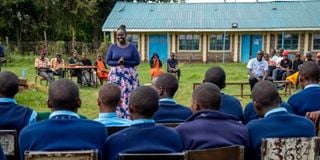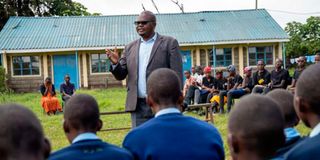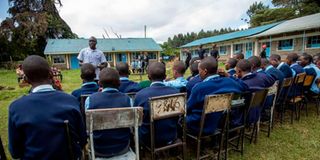Inside Kenya’s anti-FGM school clubs resisting harmful traditions

Viola Rutto from Amref Health Africa speaks to students of St Antony Boys High School in Narok, who are members of the school’s Anti-FGM Club, on May 28, 2024. The club is spearheading a campaign against FGM.
What you need to know:
- Through songs, dramas, and debates, these clubs are challenging cultural norms and educating peers on the dangers of female genital mutilation.
- The concept of anti-FGM clubs in schools was initiated by Amref Health Africa and is gaining traction in regions where FGM is prevalent.
As we arrive at St Anthony’s Boys High School in Suswa, Narok County, we are greeted by the melodious voices of students singing a Maasai song. Entering the school compound in Keekonyokie, Narok East, we find a group of students dancing passionately, adding to the vibrant atmosphere.
Led by their teachers, these students are gathered for their weekly Anti-FGM Club meeting, which always includes performances to engage and educate. The Maasai song they are singing carries a powerful message: it condemns female genital mutilation (FGM) and highlights the devastating impact this outdated practice has on girls and women. It calls for action against perpetrators and justice for survivors.
The concept of anti-FGM clubs in schools was initiated by Amref Health Africa and is gaining traction in regions where FGM is prevalent.
Arthur Mwaniki, a Form Four student and chairman of the club, explains that their goal is to educate students about the dangers of FGM and the legal prohibitions against it.
“Before joining the club, I didn't fully understand the harm caused by this cultural practice,” Arthur shares. “Now, armed with knowledge, we aim to eradicate FGM from our community. Girls should not undergo this procedure.”
Eric Malit, another student and club member, reflects on his own transformation: "Growing up, I believed FGM was acceptable because it was part of our culture. Through the club, I now understand it is wrong and illegal. As a Maasai, I have rejected the idea of marrying a cut girl, and I am spreading awareness in my community.”
Jane Wanjiku, a teacher and club patron, emphasises the club's impact on changing mind-sets among the predominantly Maasai student body.
“This club is crucial to challenging the cultural norms that support FGM and the belief that only cut girls are suitable for marriage,” Jane asserts.
School principal Wilberforce Mukhone supports the club wholeheartedly, recognising its vital role in combating rampant FGM in the area.

Wilberforce Mukhone, the principal of St Antony Boys’ High School in Suswa on May 28, 2024.
“The club is raising awareness among students and the wider community," Principal Mukhone affirms.
“It's particularly encouraging to see its focus on engaging young men, who are often the primary beneficiaries of the practice, and turning them into advocates for change.”
A short drive away, at Suswa Girls High School, we witness another impactful initiative: a drama skit performed by students in the school hall. This skit vividly portrays the tragic consequences of FGM, such as death, early marriage, and school dropout rate among girls.
Using poems, songs, dramas, and debates, the school's Anti-FGM Health Club and drama group are actively educating their peers and faculty.
Elizabeth Masindet, a Form Four student and club member since Form One, credits the club with equipping her to confront societal norms.
“The club has empowered us with knowledge about human rights and the legal repercussions of FGM,” Elizabeth states confidently.
“Now, I can educate my own parents and others about the harmful effects of this practice.”
Geoffrey Ongaki, a teacher and club patron, notes that besides raising awareness, the club has contributed to a decline in teenage pregnancies.
“Through our performances, we educate parents during school meetings, helping them understand the dangers of FGM,” Geoffrey explains.
Rebecca Jepkosgei, another teacher involved with the club, highlights its counselling services for girls who have undergone FGM, providing crucial support to manage trauma and medical issues.
Narok County, one of Kenya's 22 FGM hotspot counties, has seen significant strides through initiatives like the anti-FGM clubs.
Viola Ruto from Amref Health Africa emphasises their commitment to empowering young girls, who are most at risk, through education and advocacy.
Boys as change agents
“We aim to transform boys into agents of change within their communities," Viola explains.
"Boys play a crucial role in shifting cultural perceptions and supporting girls' rights."
The programme is currently active in 30 schools across Narok County, targeting both girls' and boys' schools. Its success has prompted plans for expansion into more schools and counties, aiming to reach even more communities affected by FGM.
Our journey continues to Oldonyiro Primary School in Isiolo North, one of the 15 schools in Isiolo County implementing the anti-FGM club concept.
Here, pupils, particularly girls, speak of new-found courage to resist pressure from parents to undergo FGM. “I now know my rights and the laws against FGM," one pupil shares confidently. “Thanks to the club, I can stand up for myself.”

Nicholas Rotich, a teacher at St Anthony Boys’ High School in Narok, addresses students on May 28, 2024.
Margaret Abenyo, a teacher and club patron at the school, emphasises the club's role in empowering girls and boys alike.
“The awareness created by the club has led to more girls staying in school and challenging the cultural norms surrounding FGM,” Margaret asserts.
In regions like Isiolo, also identified as among the 22 FGM hotspot counties in the country, these initiatives are pivotal in protecting girls and promoting their rights.
As global efforts intensify to end FGM, these local initiatives are proving instrumental in changing perceptions and safeguarding the well-being of young girls.
According to the United Nations Children's Fund, approximately four million girls and women in Kenya have undergone FGM. This practice affects 21 per cent of females aged 15 to 49 across the country.
If current trends persist, the United Nations Population Fund estimates that by 2030, 86 million girls born between 2010 and 2015 globally will be at risk of undergoing FGM.
The World Health Organisation reports that more than 200 million girls and women, worldwide, have undergone FGM, predominantly before the age of 15 in regions where the practice is prevalent.
This harmful practice often leads to immediate complications such as severe pain, shock, bleeding, infections, and challenges in urination. Additionally, it poses long-term risks to sexual, reproductive, and mental health.
In 2011, Kenya outlawed FGM through the FGM Act, which stipulates a minimum penalty of three-year imprisonment and a fine of Sh200,000 for offenders.





